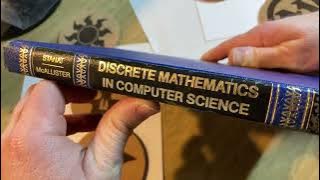
Introduction to Propositional Logic and Truth Tables
This video introduces propositional logic and truth tables. mathispower4u.com
From playlist Symbolic Logic and Proofs (Discrete Math)

Logic for Programmers: Propositional Logic
Logic is the foundation of all computer programming. In this video you will learn about propositional logic. 🔗Homework: http://www.codingcommanders.com/logic.php 🎥Logic for Programmers Playlist: https://www.youtube.com/playlist?list=PLWKjhJtqVAbmqk3-E3MPFVoWMufdbR4qW 🔗Check out the Cod
From playlist Logic for Programmers

Maths for Programmers: Logic (Logical Quantifiers)
We're busy people who learn to code, then practice by building projects for nonprofits. Learn Full-stack JavaScript, build a portfolio, and get great references with our open source community. Join our community at https://freecodecamp.com Follow us on twitter: https://twitter.com/freecod
From playlist Maths for Programmers

The Ultimate Guide to Propositional Logic for Discrete Mathematics
This is the ultimate guide to propositional logic in discrete mathematics. We cover propositions, truth tables, connectives, syntax, semantics, logical equivalence, translating english to logic, and even logic inferences and logical deductions. 00:00 Propositions 02:47 Connectives 05:13 W
From playlist Discrete Math 1

Logic: The Structure of Reason
As a tool for characterizing rational thought, logic cuts across many philosophical disciplines and lies at the core of mathematics and computer science. Drawing on Aristotle’s Organon, Russell’s Principia Mathematica, and other central works, this program tracks the evolution of logic, be
From playlist Logic & Philosophy of Mathematics

Introduction to Predicate Logic
This video introduces predicate logic. mathispower4u.com
From playlist Symbolic Logic and Proofs (Discrete Math)

This video focuses on how to write the converse of a conditional statement. In particular, this video shows how to flip the hypothesis and conclusion of a conditional statement. The concepts of truth value and logical equivalence are explored as well. Your feedback and requests are encour
From playlist Geometry

An Overview of Propositional Logic for Linguists - Semantics in Linguistics
This video covers propositional logic in #semantics for #linguistics. We talk about propositions, the negation, the conjunction, the conditional, the disjunction, truth tables, syntax of logic, tautologies, and contradictions all in 11 minutes. Join this channel to get access to perks: ht
From playlist Semantics in Linguistics

What are the basics of mathematical logic? | Intro to Math Structures VS1.1
So you want to prove things? Where do you start if you haven't ever written a proof before? In most cases, a course on discrete mathematics or mathematical structures is where someone writes their first proof and that starts with propositional calculus. In this video section, we go through
From playlist The CHALKboard 2022

Discrete Mathematics for Computer Science
In this video I will show you an older book on Discrete Mathematics. This is a course that Computer Science majors take in college in the United States. Discrete Math is considered a very tough course as many people struggle with it because it is very different from Calculus. I hope this h
From playlist Book Reviews

Squashing theories into Heyting algebras
This is the first of two videos on Heyting algebra, Tarski-Lindenbaum and negation: https://gist.github.com/Nikolaj-K/1478e66ccc9b7ac2ea565e743c904555 Followup video: https://youtu.be/ws6vCT7ExTY
From playlist Logic

This video lists an explains propositional, predicate calculus axioms, as well as a set theoretical statement that goes with it, including ZF and beyond. Where possible, the explanations are kept constructive. You can find the list of axioms in the file discussed in this video here: https:
From playlist Logic

Knights, Knaves, and Propositional Logic [Discrete Math Class]
This video is not like my normal uploads. This is a supplemental video from one of my courses that I made in case students had to quarantine. I decided that it might be of general interest for people wanting to learn about propositional logic (mathematical propositions, logical connectives
From playlist Discrete Mathematics Course

What are Non-Classical logics?
Some of the general classes of non-classical logics I touch in this videos are linear logic, relevant logic, modal logic, many-valued logics, minimal logic, paraconsistent logics and so on and so forth. Let me know if I should dive deeping into a certain scene? https://en.wikipedia.org/wi
From playlist Programming

Stanford Seminar - Preventing Successful Cyberattacks Using Strongly-typed Actors
Carl Hewitt MIT John Perry Stanford University UC Riverside June 17, 2021 Carl and John discuss how fundamental higher-order theories of mathematical structures of computer science are categorical meaning that they can be axiomatized up to a unique isomorphism thereby removing any ambi
From playlist Stanford EE380-Colloquium on Computer Systems - Seminar Series

Propositional Logic and the Algebra of Boole | MathFoundations273 | N J Wildberger
We give an overview of classical Propositional Logic, which is a branch of philosophy concerned with systematizing reason. This framework uses "atomic statements" called "propositions", and "relations", or "connectives", between them, prominently AND, OR, NOT, IMPLIES and EQUIVALENT, and t
From playlist Boole's Logic and Circuit Analysis

Learn Math Proofs with this FREE Book
In this video I go over a book that you can use to teach yourself how to write mathematical proofs. Several people have left very positive comments about this book and I agree with them, it's a great book! This book is available for FREE in pdf version. You can also purchase softcover and
From playlist Book Reviews

Determinants III (some properties) | Linear Algebra MATH1141 | N J Wildberger
We explain some basic properties of the determinant of a general n by n matrix, culminating with the multiplicative property and the condition for invertibility. ************************ Screenshot PDFs for my videos are available at the website http://wildegg.com. These give you a concis
From playlist Higher Linear Algebra
